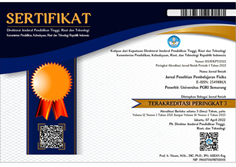Development of E-Modules Based on Socio-Scientific Issues to Improve The Creative Thinking Skills of High School Students
DOI:
https://doi.org/10.26877/jp2f.v16i2.1435Keywords:
E-Module, socio-scientific issues, creative thinkingAbstract
The research aims to develop e-modules based on socio-scientific issues that are feasible to use, determine the response of grade X students to the use of e-modules based on socio-scientific issues and determine the increase in creative thinking of grade X students. This development research is based on the 4-D model which includes four steps namely Define, Design, Develop, Disseminate. This research was conducted until the Develop stage due to the limited time of researchers in conducting research. The subjects of this study were 33 grade X students. The instruments used were expert validation assessment sheets, student response questionnaires and creative thinking skills test questions. The results of this study indicate that e-modules based on socio-scientific issues are very feasible to use because the use of e-modules can improve students' creative thinking skills with an average percentage of 91%. Students' creative thinking skills obtained an N-Gain value of 0.76 (high category). Students' response to the e-module based on socio-scientific issues is included in the very good category because this e-module presents subject matter and explanatory videos on each topic and improves students' creative thinking skills with an average percentage of 87%. Based on these results, it can be concluded that the e-module based on socio-scientific issues developed is very feasible to use.
References
[1] Latifah N, Setyadi Kurniawan E, kunci K, Flipbook Maker K and Berpikir Kritis K 2020 Pengembangan e-Modul Fisika Untuk Meningkatkan Kemampuan Berpikir Kritis Peserta Didik Development of Physics E-Modules to Improve Critical Thinking Ability of Students Jips: Jurnal Inovasi Pendidikan Sains 01 1–7
[2] Amalia I and Sujatmiko B 2022 Pengembangan E-Modul Berbantuan Flipbook Berbasis Pjbl Guna Meningkatkan Hasil Belajar Siswa Pada Mata Pelajaran Teknik Animasi 2D Dan 3D Kelas Xi Multimedia (Studi Kasus: Smkn 2 Singosari) Jurnal IT-EDU 7 92–9
[3] Sulastri H P, Irvani A I and Warliani R 2024 Pengembangan Modul Digital Fisika Berbasis Project Based Learning (PjBL) Dalam Meningkatkan Minat Belajar Peserta Didik Optika Jurnal Pendidikan Fisika 8 97–111
[4] Qamariyah S N, Rahayu S, Fajaroh F, Alsulami N M, Kimia P, Matematika F and Malang U N 2021 Machine Translated by Google Pengaruh Penerapan Pembelajaran Berbasis Inkuiri Bermasalah Sosio-saintifik Terhadap Keterampilan Berpikir Tingkat Tinggi Siswa Machine Translated by Google Journal of Science Learning 4 210–8
[5] Suryani Y, Asyhari A and Amelya P 2024 E-Modul Fisika Berbasis Socio-Scientific Issues Menggunakan Perangkat Lunak Flip Pdf Professional: Pengembangan E- Modul Pada Materi Momentum Dan Impuls Biochephy Journal of Science Education 4 366–72
[6] Anindayati A T and Wahyudi W 2020 Kajian Pendekatan Pembelajaran Stem Dengan Model Pjbl Dalam Mengasah Kemampuan Berpikir Kreatif Matematis Siswa EKSAKTA : Jurnal Penelitian dan Pembelajaran MIPA 5 217–25
[7] Sudarma M 2013 Mengembangkan Keterampilan Berpikir Kreatif (Jakarta: PT RajaGrafindo Persada)
[8] Treffinger, Donald J, Grover C, Edwin C, Young G C and Selby E C 2002 ON THE GIFTED University of Connecticut University of Virginia Assessing Creativity : A Guide for Educators (Research Monograph Series)
[9] Syarlisjiswan M R, Diani R and Alfiani P 2024 E-Modul Fisika Dengan Canva: Mengitegrasikan Socio Scientific Issues Untuk Pembelajaran Masa Kini BIOCHEPHY: Journal of Science Education 4 274–88
[10] Sugiyono 2019 Metodologi Penelitian Kuantitatif, Kualitatif dan R & D
[11] Ramdhani E P, Khoirunnisa F and Siregar N A N 2020 Efektifitas Modul Elektronik Terintegrasi Multiple Representation Pada Materi Ikatan Kimia Journal of Research and Technology 6 162–7
[12] Oktavia M and Prasasty A T 2019 Uji Normalitas Gain Untuk Pemantapan Dan Modul Dengan One Group Pre And Post Test Simp. Nas. Ilm. Dengan Tema (Peningkatan Kualitas Publ. Ilm. Melalui Has. Ris. Dan Pengabdi. Kpd. Masyarakat) 3 596–601
[13] Ajri A S and Diyana T N 2023 Pengembangan e-modul berbasis problem based learning berbantuan liveworksheets untuk mengoptimalkan keterampilan pemecahan masalah Jurnal Kajian Pendidikan IPA 3 223–34
[14] Hoffman J D, Ivcevic Z and Maliakkal N 2020 No Title Journal of Creative Behavior 54 293–310
[15] Garrido A and Couso D 2015 Socio-scientific issues ( SSI ) in initial training of primary school teachers : Pre- service teachers ’ conceptualization of SSI and appreciation of the value of teaching SSI Procedia - Social and Behavioral Sciences 196 80–8
[16] Mubarok A Z Z, Ismet I and Kistiono K 2022 Pengembangan Modul Elektronik Fisika untuk Meningkatkan Kemampuan Berpikir Kreatif Peserta Didik Pada Materi Hukum Newton Jurnal Ilmiah Pendidikan Fisika 6 87–98
[17] Anjiana R, Makiyah Y S and Susanti E 2024 Pengaruh Model Creative Problem Solving (CPS) Terhadap Self Efficacy dan Keterampilan Berpikir Kreatif Peserta Didik Pada Materi Optik Jurnal Penelitian Pembelajaran Fisika 15 204–12
[18] Imelda and Anazelina D 2019 Respon Siswa Terhadap Pembelajaran Problem Based Learning dalam Meningkatkan Higher Order Thinking Skill Jurnal of Mathematics Education and Science 5 11–9
[19] Pursitasari I D, Alfitriyani N and Kurniasih S 2022 Enhancing Students ’ Creative Thinking Skills through Biotechnology Module based Socio-Scientific Issues Journal of Research in Science Education 8 939–48
[20] Yuyun S, Harjono A and Gunada I W 2022 Developing Flipbook-Based Physics E-Module to Increase Students’ Learning Outcome And Motivation Jurnal Pendidikan Fisika dan Teknologi 8 163-175





